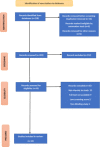Effectiveness of artificial intelligence-assisted colonoscopy in early diagnosis of colorectal cancer: a systematic review
- PMID: 36917126
- PMCID: PMC10389330
- DOI: 10.1097/JS9.0000000000000285
Effectiveness of artificial intelligence-assisted colonoscopy in early diagnosis of colorectal cancer: a systematic review
Abstract
Introduction: As artificial intelligence (AI)-assisted diagnosis gained immense popularity, it is imperative to consider its utility and efficiency in the early diagnosis of colorectal cancer (CRC), responsible for over 1.8 million cases and 881 000 deaths globally, as reported in 2018. Improved adenoma detection rate, as well as better characterizations of polyps, are significant advantages of AI-assisted colonoscopy (AIC). This systematic review (SR) investigates the effectiveness of AIC in the early diagnosis of CRC as compared to conventional colonoscopy.
Materials and methods: Electronic databases such as PubMed/Medline, SCOPUS, and Web of Science were reviewed for original studies (randomized controlled trials, observational studies), SRs, and meta-analysis between 2017 and 2022 utilizing Medical Subject Headings terminology in a broad search strategy. All searches were performed and analyzed according to the Preferred Reporting Items for Systematic Reviews and Meta-Analysis methodology and were conducted from November 2022. A data extraction form based on the Cochrane Consumers and Communication Review group's extraction template for quality assessment and evidence synthesis was used for data extraction. All included studies considered for bias and ethical criteria and provided valuable evidence to answer the research question.
Results: The database search identified 218 studies, including 87 from PubMed, 60 from SCOPUS, and 71 from Web of Science databases. The retrieved studies from the databases were imported to Rayyan software and a duplicate article check was performed, all duplicate articles were removed after careful evaluation of the data. The abstract and full-text screening was performed in accordance with the following eligibility criteria: Strengthening the Reporting of Observational Studies in Epidemiology (STROBE) for observational studies; Preferred Reporting Items for Systematic Reviews and Meta-Analysis for review articles, ENTREQ for narrative studies; and modified JADAD for randomized controlled trials. This yielded 15 studies that met the requirements for this SR and were finally included in the review.
Conclusion: AIC is a safe, highly effective screening tool that can increase the detection rate of adenomas, and polyps resulting in an early diagnosis of CRC in adults when compared to conventional colonoscopy. The results of this SR prompt further large-scale research to investigate the effectiveness in accordance with sex, race, and socioeconomic status, as well as its influence on prognosis and survival rate.
Copyright © 2023 the Author(s). Published by Wolters Kluwer Health, Inc.
Conflict of interest statement
Authors declare no conflict of interest.
Sponsorships or competing interests that may be relevant to content are disclosed at the end of this article.
Figures
Comment in
-
Commentary on 'Effectiveness of artificial intelligence-assisted colonoscopy in early diagnosis of colorectal cancer: a systematic review'.Int J Surg. 2023 Jun 1;109(6):1800-1801. doi: 10.1097/JS9.0000000000000398. Int J Surg. 2023. PMID: 37131336 Free PMC article. No abstract available.
-
A commentary on 'Effectiveness of artificial intelligence-assisted colonoscopy in early diagnosis of colorectal cancer: a systematic review'.Int J Surg. 2023 Nov 1;109(11):3663-3664. doi: 10.1097/JS9.0000000000000598. Int J Surg. 2023. PMID: 37463029 Free PMC article. No abstract available.
References
-
- Areia M, Mori Y, Correale L, et al. Cost-effectiveness of artificial intelligence for screening colonoscopy: a modelling study. Lancet Digit Health 2022;4:e436–e444. - PubMed
-
- Csanádi M, Gini A, de Koning H, et al. Modeling costs and benefits of the organized colorectal cancer screening programme and its potential future improvements in Hungary. J Med Screen 2021;28:268–276. - PubMed
Publication types
MeSH terms
LinkOut - more resources
Full Text Sources
Medical
Research Materials
Miscellaneous



